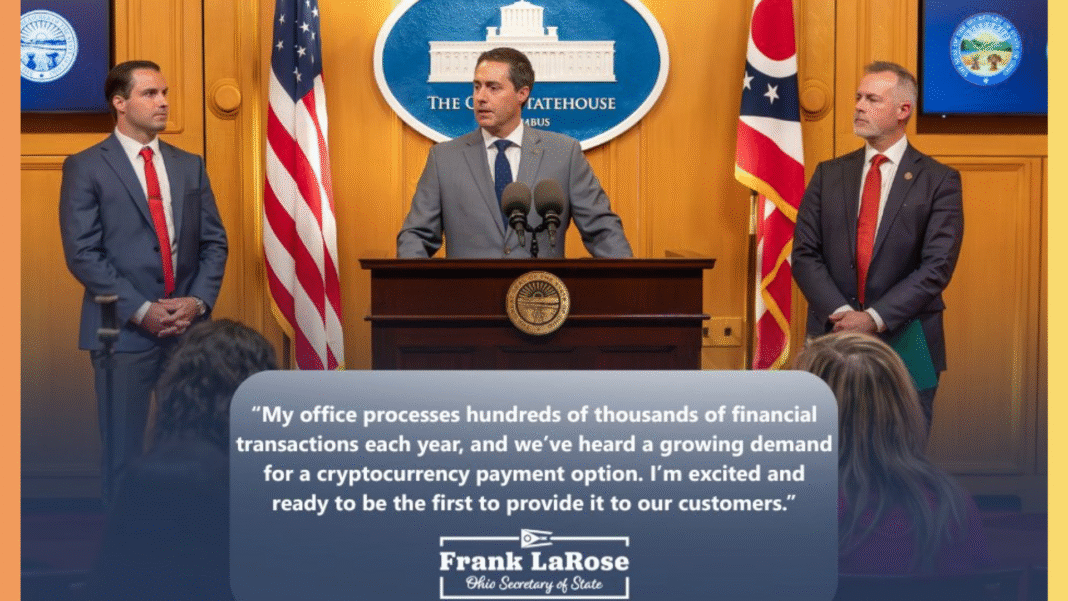Ohio has made a groundbreaking move towards using cryptocurrency in public finance, as the Ohio State Board of Deposit unanimously authorized a vendor to process digital asset payments (including Bitcoin) for state fees and services.
Ohio Secretary of State Frank LaRose announced on X that the vote was a “bold action” that puts Ohio in a leadership position in the digital economy.
LaRose pointed out that his office processes hundreds of thousands of transactions each year and has seen requests from residents for a cryptocurrency payment method increase.
As a result of Wednesday’s vote, Ohio is now one of the first states in the country to allow government services to formally accept crypto payments.
Months of Work Lead to Breakthrough Decision
This achievement comes after months of coordinating efforts involving Ohio officials.
The effort began in April when Secretary of State LaRose and Treasurer Robert Sprague encouraged the board to allow for cryptocurrency payments, which were voted on in May.
After a unanimous board vote, a vendor contract still needed to be completed and executed in order for this measure to become a reality. This week, the contract step is finalized and cleared to implement.
LaRose describes himself as thankful that it is a part of Ohio’s business community and a continual reason Ohio is one of the top five states for business, recognized in various surveys, and Ohio’s willingness to be part of “tools, trends, and technologies that help incentivize job creators.”
Part of Ohio’s Larger Digital Asset Push
The decision is in line with the greater acceptance of blockchain and digital assets in Ohio.
In June, the Ohio Blockchain Basics Act received legislative approval, which will prohibit local governments from prohibiting their use and exempts small transactions of less than $200 from capital gains tax.
LaRose has also supported House Bill 18, which would create a Strategic Crypto Reserve funded by portions of the state’s investment income.
He used the Trump administration’s Working Group on Digital Asset Markets as an example, and put Ohio’s crypto strategy in a national context that made the U.S. the “crypto capital of the planet.”
Also Read: Arizona State Passes HB2324 to Create a Bitcoin Reserve Fund from Confiscated Criminal Crypto Assets
Broader Trend of State-Level Crypto Acceptance
Ohio’s decision is part of an increasing trend for U.S. states to adopt cryptocurrency within their respective governments.
The Bitcoin Laws tracker has reported that 47 states have introduced Strategic Bitcoin Reserve (SBR) bills, even though maybe only 26 remain under consideration.
The states within reasonable reach of advancing legislation are Arizona, Texas, and New Hampshire, while Michigan’s Bitcoin reserve bill gained traction once again after several months with no movement.
California’s Assembly passed AB 1180 by unanimous vote on June 4th, which instructs its Department of Financial Protection and Innovation (DFPI) to develop regulations for receiving payments of cryptocurrency, and further report its findings on transactions, UnoCrypto reported.
Ultimately, these actions across various states demonstrate a changing regulatory environment, indicating that a shift toward crypto adoption within government services is an actual thing.
Also Read: 22 U.S. States Push for Bitcoin and Digital Asset Regulations Amid Growing Crypto Adoption


